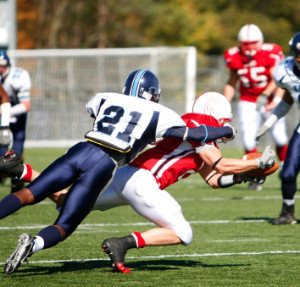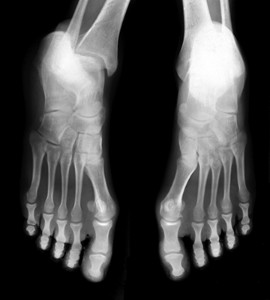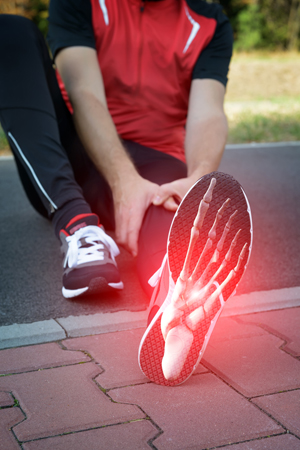Freehold (732) 294-9393
Freehold (732) 294-9393
 After having sustained a number of foot and ankle injuries to their players, Navy football is making some changes to prevent future injuries. With three players having suffered from foot injuries and one from a knee injury, coaches had to find an answer. Two problems were discovered: turf fields and player footwear. For some time, turf fields have come under scrutiny for potentially causing more injuries to players than grass fields. However when it came to footwear, the staff was in for a surprise. Most players were found wearing poorly-fitted cleats. Furthermore, most Navy players must wear dress shoes to classes, which are less comfortable. To solve this, players were all examined to determine if they needed orthotics for their dress shoes to give them better support. Players were also considered for custom-fitted cleats, if needed. Coaches and staff are now feeling more confident that they’ll be better prepared for potential future injuries.
After having sustained a number of foot and ankle injuries to their players, Navy football is making some changes to prevent future injuries. With three players having suffered from foot injuries and one from a knee injury, coaches had to find an answer. Two problems were discovered: turf fields and player footwear. For some time, turf fields have come under scrutiny for potentially causing more injuries to players than grass fields. However when it came to footwear, the staff was in for a surprise. Most players were found wearing poorly-fitted cleats. Furthermore, most Navy players must wear dress shoes to classes, which are less comfortable. To solve this, players were all examined to determine if they needed orthotics for their dress shoes to give them better support. Players were also considered for custom-fitted cleats, if needed. Coaches and staff are now feeling more confident that they’ll be better prepared for potential future injuries.
If you are having discomfort in your feet and would like to try orthotics, contact Dr. Henry Miller from New Jersey. Our doctor can provide the care you need to keep you pain-free and on your feet.
What Are Orthotics?
Orthotics are inserts you can place into your shoes to help with a variety of foot problems such as flat feet or foot pain. Orthotics provide relief and comfort for minor foot and heel pain but can’t correct serious biomechanical problems in your feet.
Over-the-Counter Inserts
Orthotics come in a wide variety of over-the-counter inserts that are used to treat foot pain, heel pain, and minor problems. For example, arch supports can be inserted into your shoes to help correct overarched or flat feet, while gel insoles are often used because they provide comfort and relief from foot and heel pain by alleviating pressure.
Prescription Orthotics
If over-the-counter inserts don’t work for you or if you have a more severe foot concern, it is possible to have your podiatrist prescribe custom orthotics. These high-quality inserts are designed to treat problems such as abnormal motion, plantar fasciitis, and severe forms of heel pain. They can even be used to help patients suffering from diabetes by treating foot ulcers and painful calluses and are usually molded to your feet individually, which allows them to provide full support and comfort.
If you are experiencing minor to severe foot or heel pain, it’s recommended to speak with your podiatrist about the possibilities of using orthotics. A podiatrist can determine which type of orthotic is right for you and allow you to take the first steps towards being pain-free.
If you have any questions please contact our office located in Freehold, NJ . We offer the newest diagnostic and treatment technologies for all your foot and ankle needs.
Read more about Foot Orthotics Researchers from South Korea have discovered a new method to predict if bunions will reemerge after surgery. The team utilized X-ray imaging and identified reemergence as a hallux valgus angle (HVA) of 20 degrees or more. Using this information, the team was able to predict the recurrence of bunions. Recurrence was more likely if the postoperative HVA was eight degrees or more. An HVA of 40 degrees or more also increased the likelihood of reemergence after surgery. The researchers are hopeful that more research will confirm the data, as this could help future surgeries and patients.
Researchers from South Korea have discovered a new method to predict if bunions will reemerge after surgery. The team utilized X-ray imaging and identified reemergence as a hallux valgus angle (HVA) of 20 degrees or more. Using this information, the team was able to predict the recurrence of bunions. Recurrence was more likely if the postoperative HVA was eight degrees or more. An HVA of 40 degrees or more also increased the likelihood of reemergence after surgery. The researchers are hopeful that more research will confirm the data, as this could help future surgeries and patients.
If you are suffering from bunions, contact Dr. Henry Miller of New Jersey. Our doctor can provide the care you need to keep you pain-free and on your feet.
What Is a Bunion?
A bunion is formed of swollen tissue or an enlargement of boney growth, usually located at the base joint of the toe that connects to the foot. The swelling occurs due to the bones in the big toe shifting inward, which impacts the other toes of the foot. This causes the area around the base of the big toe to become inflamed and painful.
Why Do Bunions Form?
Genetics – Susceptibility to bunions are often hereditary
Stress on the feet – Poorly fitted and uncomfortable footwear that places stress on feet, such as heels, can worsen existing bunions
How Are Bunions Diagnosed?
Doctors often perform two tests – blood tests and x-rays – when trying to diagnose bunions, especially in the early stages of development. Blood tests help determine if the foot pain is being caused by something else, such as arthritis, while x-rays provide a clear picture of your bone structure to your doctor.
How Are Bunions Treated?
If you have any questions, please feel free to contact our office located in Freehold, NJ . We offer the newest diagnostic and treatment technologies for all your foot care needs.
 If you are a runner, there are certain rules that you should follow in order to prevent yourself from becoming injured. One of the most important things you can do is to wear shoes that fit properly, and to use shoe inserts when necessary. Proper shoes will help correct foot-motion issues that could potentially lead to injury. Another tip is to pay attention to any pain you are experiencing in your feet. If you sense that there is a pain in your feet, you should take a break and figure out what is going on so that you can treat it.
If you are a runner, there are certain rules that you should follow in order to prevent yourself from becoming injured. One of the most important things you can do is to wear shoes that fit properly, and to use shoe inserts when necessary. Proper shoes will help correct foot-motion issues that could potentially lead to injury. Another tip is to pay attention to any pain you are experiencing in your feet. If you sense that there is a pain in your feet, you should take a break and figure out what is going on so that you can treat it.
Exercising your feet regularly with the proper foot wear is a great way to prevent injuries. If you have any concerns about your feet, contact Dr. Henry Miller of New Jersey. Our doctor will treat your foot and ankle needs.
How to Prevent Running Injuries
Many common running injuries are caused by overuse and overtraining. When the back of the kneecap starts wearing out and starts causing pain in your knee, this is commonly referred to as runner’s knee. Runner’s knee is a decrease in strength in your quadriceps and can occur if you’re not wearing properly fitted or supporting shoes. To prevent runner’s knee, focusing on hip strengthening is a good idea, as well as strengthening your quads to keep the kneecaps aligned.
What Are Some Causes of Running Injuries?
- One cause of a common running injury is called iliotibial band syndrome.
- Plantar fasciitis is also another common injury.
- Stress fractures can occur from overtraining, lack of calcium, or even your running style.
Best Ways to Prevent Running Injuries
- Wear footwear that fits properly and suits your running needs.
- Running shoes are the only protective gear that runners have to safeguard them from injury.
- Make a training schedule. Adding strengthening exercises as well as regular stretching can help keep you strong and limber and can lessen the possibility of injuries.
- Stretching keeps muscles limber; this will help you gain better flexibility.
If you have any questions please feel free to contact our office located in Freehold, NJ . We offer the newest diagnostic and treatment technologies for all your foot and ankle needs.
 Green Bay Packers’ defensive lineman Montravius Adams’ season is now “in jeopardy” after suffering a stress fracture. According to Ian Rapoport of the NFL Network, Adams is expected to have a screw inserted into his foot due to the injury. As a result of the fracture, the defensive lineman will miss “multiple weeks” of gameplay. Regarding the injury, Packers coach Mike McCarthy said, “I don’t think it’s time for concern,” and added, “It’s the unfortunate part of our game.”
Green Bay Packers’ defensive lineman Montravius Adams’ season is now “in jeopardy” after suffering a stress fracture. According to Ian Rapoport of the NFL Network, Adams is expected to have a screw inserted into his foot due to the injury. As a result of the fracture, the defensive lineman will miss “multiple weeks” of gameplay. Regarding the injury, Packers coach Mike McCarthy said, “I don’t think it’s time for concern,” and added, “It’s the unfortunate part of our game.”
Activities where too much pressure is put on the feet can cause stress fractures. To learn more, contact Dr. Henry Miller from New Jersey. Our doctor can provide the care you need to keep your pain free and on your feet.
Dealing with Stress Fractures of the Foot and Ankle
Stress fractures occur in the foot and ankle when muscles in these areas weaken from too much or too little use. The feet and ankles then lose support when walking or running from the impact of the ground. Since there is no protection, the bones receive the full impact of each step. Stress on the feet can cause cracks to form in the bones, thus creating stress fractures.
What Are Stress Fractures?
Stress fractures occur frequently in individuals whose daily activities cause great impact on the feet and ankles. Stress factors are most common among:
Symptoms
Pain from the fractures occur in the area of the fractures and can be constant or intermittent. It will often cause sharp or dull pain with swelling and tenderness. Engaging in any kind of activity which involves high impact will aggravate pain.
If you have any questions please feel free to contact our office located in Freehold, NJ . We offer the newest diagnostic and treatment technologies for all your foot and ankle needs.
 Hyperhidrosis is a disorder in which the body produces an unnecessary amount of sweat in the eccrine glands. The condition affects both genders equally, and it is often classified as either a primary or secondary condition. Primary hyperhidrosis tends to take place in the hands, feet, or it can be generalized, meaning it occurs throughout the entire body. If your hyperhidrosis has been classified as a secondary medical condition, this means it has been triggered by another pre-existing medical problem you have. If you are experiencing chronic sweaty feet, make sure to keep them as dry as possible, keep your socks clean, and see a podiatrist for a proper diagnosis.
Hyperhidrosis is a disorder in which the body produces an unnecessary amount of sweat in the eccrine glands. The condition affects both genders equally, and it is often classified as either a primary or secondary condition. Primary hyperhidrosis tends to take place in the hands, feet, or it can be generalized, meaning it occurs throughout the entire body. If your hyperhidrosis has been classified as a secondary medical condition, this means it has been triggered by another pre-existing medical problem you have. If you are experiencing chronic sweaty feet, make sure to keep them as dry as possible, keep your socks clean, and see a podiatrist for a proper diagnosis.
If you are suffering from hyperhidrosis contact Dr. Henry Miller of New Jersey. Our doctor can provide the care you need to attend to all of your foot and ankle needs.
Hyperhidrosis of the Feet
Hyperhidrosis is a rare disorder that can cause people to have excessive sweating of their feet. This can usually occur all on its own without rigorous activity involved. People who suffer from hyperhidrosis may also experience sweaty palms.
Although it is said that sweating is a healthy process meant to cool down the body temperature and to maintain a proper internal temperature, hyperhidrosis may prove to be a huge hindrance on a person’s everyday life.
Plantar hyperhidrosis is considered to be the main form of hyperhidrosis. Secondary hyperhidrosis can refer to sweating that occurs in areas other than the feet or hands and armpits. Often this may be a sign of it being related to another medical condition such as menopause, hyperthyroidism and even Parkinson’s disease.
In order to alleviate this condition, it is important to see your doctor so that they may prescribe the necessary medications so that you can begin to live a normal life again. If this is left untreated, it is said that it will persist throughout an individual’s life.
A last resort approach would be surgery, but it is best to speak with your doctor to find out what may be the best treatment for you.
If you have any questions please feel free to contact our office located in Freehold, NJ . We offer the newest diagnostic and treatment technologies for all your foot and ankle needs.